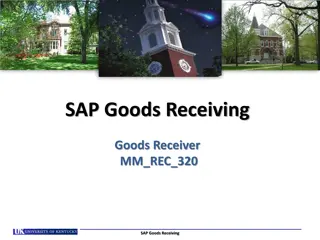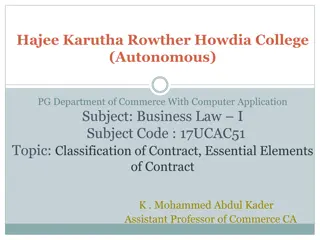Understanding Delivery of Goods in Sale Contracts
Performance of a contract of sale involves the delivery of goods from the seller to the buyer, along with acceptance and payment as per the terms. Delivery can be actual, symbolic, or constructive, with specific rules governing possession, payment, time, place, and expenses related to the delivery process.
Download Presentation

Please find below an Image/Link to download the presentation.
The content on the website is provided AS IS for your information and personal use only. It may not be sold, licensed, or shared on other websites without obtaining consent from the author. Download presentation by click this link. If you encounter any issues during the download, it is possible that the publisher has removed the file from their server.
E N D
Presentation Transcript
Prepared By Dr. SHAHID IQBAL Guest Faculty, Marwari College, Darbhanga, Mobile No. and Whatsup No. : 7004160257 Email ID: shahidlnmu@gmail.com 1
Performance of Contract of Sale: According to sec.31 of the Sale of Goods Act, performance of contract of sale means as regards seller delivery of goods to the buyer, and as regards the buyer acceptance of the delivery of the goods and payment for them, in accordance with the terms of the contract of sale. Delivery of the Goods: Sec. 2(2) of the Sale of Goods Act defines delivery as a voluntary transfer of possession from one person to another. The delivery of goods may be actual, symbolic or constructive. 2
1. Actual delivery: - When the goods are handed over by the seller to the buyer or his duly authorized agent, the delivery is said to be actual. 2. Symbolic delivery: Where the goods are bulky and heavy, it is not possible to give actual delivery of the goods. In such a case, the control over the goods is transferred by delivery of a symbol. 3. Constructive delivery or delivery by atonement: When a person who is in a possession of goods accepts or acknowledges holding them on behalf of the buyer, it is called constructive delivery. 3
Rules regarding delivery: - Following are the provision relating to the delivery of goods by the seller to the buyer: 1. Possession of goods: Delivery should have the effect of putting the buyer in possession of the goods. So a delivery to anyone other than the buyer or his agent is insufficient. 2. Delivery and payment are concurrent conditions:-The seller should be ready to hand over the possession of goods and the buyer should be ready to pay the price. 3. Part delivery: A delivery of part of the goods has the effect of delivery provided such part delivery is made in progress of the delivery of the whole(Sec. 34) 4. Buyer to apply for delivery: Unless expressly agreed to the contrary, the seller is not bound to deliver them until the buyer applies for delivery. 4
5. Time of delivery: - in a contract of sale, the delivery of goods should be made within a reasonable time unless a time is fixed in the contract. 6. Place of delivery: - Where the place of delivery is stated in the contract, the goods must be delivered at the specified place during working hours on a working day. 7. Goods in possession of third person: - When the goods at the time of sale are in possession of a third person, delivery takes place if such third person acknowledges to the buyer that he holds the goods on his behalf. 8. Expenses of delivery: - The seller should bear the expenses of putting the goods into a deliverable state and also the incidental expenses unless otherwise agreed. 9. Installment delivery: - Unless both the parties agree, the buyer of goods is not bound to accept delivery thereof by installments. 5
10. Delivery to a carrier by wharfinger: Delivery of goods to a carrier for the purpose of transmission to the buyer or the delivery of the goods to a wharfinger for safe custody is prima facie deemed to be delivery of the goods to the buyer. 11. Buyer right of examining the goods: - Where the goods are delivered to the buyer which he has not previously examined, he is entitles to examine them for his satisfaction. He is not deemed to have accepted them unless and until he has had a reasonable opportunity for such examination. 12. Return of rejected goods: - A mere fact that goods have been received does not lead to acceptance. In certain cases, buyer has a right to reject the goods after having received them. In such cases, the buyer is not bound to return the goods to the seller. It should be sufficient if he intimate his rejection. 6
13. Examination of goods by the buyer: - Where goods are delivered to the buyer which he has not previously examined, he is not deemed to have accepted them unless and until he is given a reasonable opportunity of examining the goods. 14. When wrong quantity is delivered: - Where the quantity delivered is different from the quantity contracted then, the buyer accepts the goods which are in accordance with the contract and reject the rest. 15. Liability of buyer for neglecting or refusing delivery of goods: - When a seller is ready and willing to deliver the goods and requests the buyer to take delivery, and the buyer fails to take delivery within a reasonable time of that request, the buyer is liable to compensate the seller for any loss arising due to his neglect or refusal to take delivery plus a reasonable charge for the care and custody of the goods. 7























